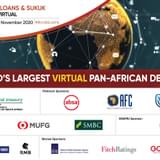Last December, Akufo-Addo, the leader of the New Patriotic Party (NPP) who narrowly lost against Mahama in 2012, was elected with an absolute majority on a pro-business platform following eight years of rule by the National Democratic Congress (NDC).
Throughout his campaign, he promised to reduce government inefficiency and restore growth by slimming down public spending and targeting productive sectors of the economy with tax cuts.
He ceremoniously kicked off the new year with an ambitious pledge to put a dam in every village and a factory in every district – ambitious for an economy plagued by rolling power cuts, persistently depressed oil prices, lower consumption and more recently, an eroding fiscal position. In February, the Ministry of Finance revealed it had inherited a fiscal deficit twice the size it had originally estimated; the previous government had revised down its deficit target last year from 5.3% of GDP to 5%, but recently released figures suggest overspending actually touched 9.3% of GDP.
“We were fairly surprised when the announcement [on the deficit] was made,” said David Hedley, Chief Africa Economist at the International Institute of Finance (IIF) in Washington, D.C. “This has all sorts of implications, not the least of which the government’s ability to deliver on its spending promises, and the performance of the cedi.”
Hedley’s team expected the cedi to depreciate about 10% against the US dollar throughout the year, largely the result of a stronger dollar and uncertainty in the global macro environment among other reasons – but that depreciation has already occurred. The cedi dropped 11.2% from GHS4.27 per US dollar to GHS4.76 in early March, before rebounding slightly to GHS4.65 by the middle of the month.
“It has implications for monetary policy. Inflation is falling and will likely continue to fall, but with inflation higher imports will become costlier, so the downward trajectory in inflation may well be slower than we anticipated. We originally anticipated inflation would be back in target range by the end of 2017, but that’s unlikely to happen. The Bank of Ghana has started easing monetary policy because in real terms rates are high, but it will need to be a bit more cautious if the exchange rate continues to show heightened vulnerability, which could jeopardize its ability to reach its target range.”
With little visibility on where the fiscal spillage occurred, some analysts have begun to suspect some politicking may be involved – and that the real economic impact of the revised fiscal figures may be overstated to an extent.
“If Ghana can start from a higher deficit position and prove it can still keep the economy on track while bringing that deficit number down, it certainly looks good on the new administration,” said Yvonne Mhango, a Sub Saharan Africa economist at Renaissance Capital. “Still, delivering on its campaign promises will be easier said than done.”
Caught Between a Deficit and a Hard Place
The country’s growing public debt pile also risks exacerbating its fiscal dilemma. Ghana’s total public debt for 2016 rose to 73.3% of GDP, up from 71.63% in 2015. But a large proportion of that public debt – just over half – is denominated in US dollars, so any continued depreciation of the cedi is likely to add to its debt burden.
“We thought that the debt ratio may have peaked at the end of last year, but if the cedi does continue to depreciate then those debt ratios won’t look so good, which also means that the cost of borrowing is likely to become more expensive,” Hedley explained.
The IMF, which in 2015 inked a three-year US$918mn funding package with the West African country, has remained relatively upbeat in the wake of the deficit revelations, while acknowledging the country’s challenges.
“Ghana’s economy continues to face challenges. While the estimated economic growth of 3.6% in 2016 exceeded our target of 3.3%, the decline in inflation has been slower than expected. The current account deficit narrowed to 6.5% of GDP, contributing to a small build-up of foreign exchange reserves,” Joël Toujas-Bernaté, the IMF mission chief to Ghana said following his visit with senior government officials in February, adding that the fiscal overrun was largely due to poor oil and non-oil revenue performance and large expenditure overruns.
“The large fiscal slippages observed last year will, indeed, require strong efforts of fiscal consolidation to support debt sustainability.”
He said the new government’s intentions to reduce tax exemptions, improve tax compliance, and review widespread earmarking of revenues should help address slippages, but that “significant public spending commitments that bypassed public finance management (PFM) systems were reported,” prompting the government to announce a full audit of all outstanding obligations. The PFM was one of the key sticking points for the IMF and the Ghanaian government’s attempts at routing out corruption.
The large financial imbalances of state-owned enterprises, another priority for the IMF in disbursing the funds, still “needs to be addressed urgently to avoid the build-up of contingent liabilities for the new government,” he added.
Presenting the budget in March, Minister Ken Ofori-Atta reaffirmed the country’s bid to foster a business-friendly environment but largely targeted managing inflation and taxation – plugging tax loopholes, reducing tax rates and expanding the tax base – as a means of getting the country’s deficit back on track.
He said the fiscal deficit had been revised down slightly to 8.7%, with the aim of clawing that back down to 6.5% by the year end. The government also said it will aim to bring inflation down from 13.3% in January to 11.3% by December 2017.
The country’s growth prospects could get a big boost from oil exports, which disappointed in 2016.
Last year’s decline in production from the Jubilee field, one of the country’s largest oil fields, due to technical challenges and upgrade requirements was partly offset by output from the TEN field, which came into production in September and has a capacity of about 80,000 barrels per day – though a legal dispute with neighbouring Cote D’Ivoire, which shares the field, means production will be capped until a resolution can be found.
According to data from Tullow Oil and GNPC and compiled by the IIF, Ghana produced just under an average of 100,000 barrels per day in 2016. With the Jubilee field looking likely to come back online in the second quarter of 2017 and the new Sankofa integrated oil and gas project due to come online in August, Ghana could see production rise to just under 130,000 barrels per day in 2017 and jump up to nearly 210,000 barrels per day in 2018.
Where Does That Leave Credit?
It’s difficult to say. The government of Ghana is one of the most frequent issuers in Sub-Saharan Africa, and has accessed the capital markets each year since 2013. It last sold 5-year bonds in January and 2-year notes in February in the local market, after tapping up the international capital markets for US$1bn in October last year.
But exchange rate risk, and sentiment risk, makes the country extremely vulnerable to the capriciousness of international emerging market investors, particularly with a stronger dollar and US interest rate hikes on the horizon. Indeed, among all outstanding Eurobonds issued by Sub-Saharan African countries, Ghana’s 2018s were the only ones to see a price drop in 2017 according to data from Bloomberg, as investors dumped the notes in the days following the news about the deficit.
Last year saw a huge influx of non-resident portfolio inflows into Ghana; non-residents now account for just over a quarter of the country’s domestic debt, up from 17.3% just a year later. During that period, domestic debt also increased over 2%, to 28% of GDP.
The fiscal side of the story is still top of mind for most investors.
“Higher oil revenues and the passing of one-off factors such as the elections will help, but the extent of the slippage last year means that the government will be constrained in delivering quickly on its electoral promises of industries and dams,” said Raza Agha, and EM sovereign credit analyst and chief economist for the Middle East and Africa at VTB Capital. “The new government has renewed its commitment to the IMF program, but it will need to deliver a very strong fiscal adjustment.”
Agha did say that pressures on the external sectors should ease with the new government promising fiscal consolidation, and a rise in commodity exports.
“Meanwhile, the passing of election uncertainties and a renewed commitment to the IMF should help FDI levels, providing funding for the current account deficit. Depending on the boost from higher commodity exports and higher FDI, FX reserves should increase over 2017 from US$6.2bn reported in December 2016,” he explained.
For his part, Minister Ofori-Atta is making many of the right moves. In the latest budget, he abolished or reduced over a dozen taxes and levies, mostly value-added taxes on different goods and services and contributions towards state subsidies. He also removed taxes on gains from stocks traded on the Ghana Stock Exchange as well as publicly listed securities. All of which are credit positives.
“Ghana is a good story, but the risks have increased along with the unexpected fiscal deterioration and the repercussions are only just starting to be reflected in the currency and bond yields. But, if you look through the smoke, the growth story is looking good, the current account deficit is narrowing, and if the new administration carries through with its business-friendly policies, investors should be pleased,” Hedley concluded.









